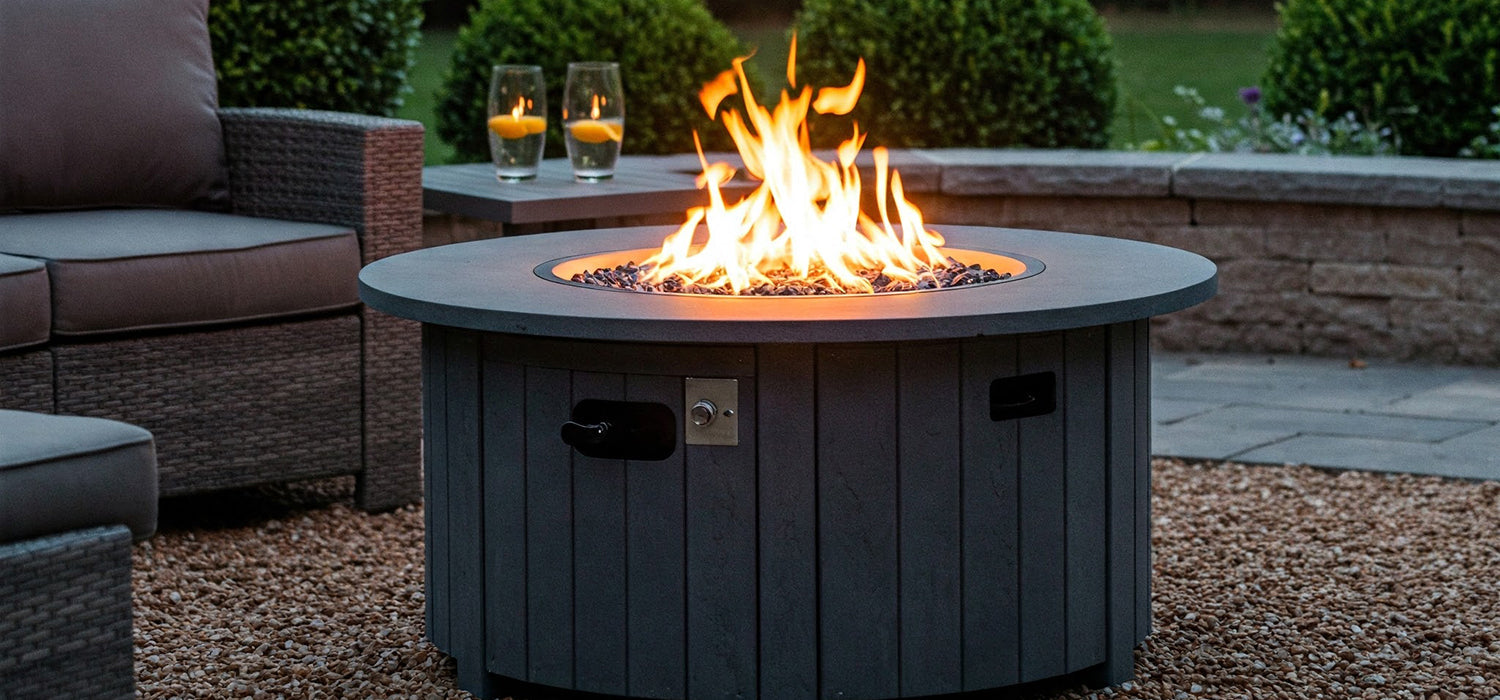
Why Does My Gas Fire Pit Sound Like Wind? Here’s What’s Going On
So, your gas fire pit sounds like a mini windstorm? Don’t worry, it’s usually a quick fix! Whether you’ve got a cosy fire table or an outdoor pit, this common issue is caused by gas flow or airflow problems. Keep reading to learn how to silence that noisy flame and enjoy peaceful evenings!
Common Causes of Wind-Like Sounds
It’s frustrating when your relaxing evening by the fire gets ruined by a sudden, loud wind-like sound. But before you start worrying about a gas leak or malfunction, let’s dive into what’s likely going on.
Gas Pressure Issues:
High Gas Pressure Causing Vibration
Excess gas pressure can cause the gas to rush out faster than it should. This leads to a noisy, whooshing sound, similar to a gust of wind or even a mini tornado in your fire pit. When there’s too much pressure, it forces the gas to move erratically, causing vibrations that create unwanted noise.
Regulator Problems
If you’ve had your fire pit for a while or it’s using an old regulator, the pressure might be out of whack. A malfunctioning regulator can send too much gas to the burner, leading to that loud wind-like sound. You might need to replace it with a more efficient one or simply adjust it if it’s an adjustable type.
Burner Port Blockages:
Debris or Dirt Clogging Burner Ports
Sometimes the culprit behind the windy noise isn’t the gas pressure but the burner itself. Dust, dirt, or even spider webs can clog the tiny burner ports. This disrupts the flow of gas, causing turbulence that results in a roaring, wind-like sound.
Uneven Gas Flow
When the burner ports are blocked, the gas can’t flow evenly through the burner. This creates uneven combustion and, ultimately, that noisy "windstorm" effect. It’s important to ensure these tiny holes stay clear so the gas flows smoothly and quietly.
Gas Line Restrictions:
Kinked or Damaged Gas Lines
If the gas lines are kinked, damaged, or even slightly pinched, it can restrict the flow of gas. This can result in fluctuating pressure and, yes, that dreaded wind-like sound. Sometimes a little kink in the line is all it takes to make your peaceful fire night sound like a hurricane.
Improperly Sized Gas Lines
Another issue could be that the gas lines are too small for your fire pit’s needs. If the lines can’t deliver enough gas to the burner, it causes an imbalance in pressure and airflow. And that imbalance? It can lead to a noisy flame and that annoying wind sound.
Troubleshooting and Repair Steps
Now that you’ve got a better idea of what’s causing the noise, it’s time to roll up your sleeves and tackle the issue. Don’t worry, these steps are simple and can help restore the peaceful ambiance of your fire pit.
Adjusting Gas Pressure:
Adjusting the Regulator (If Applicable)
The first thing you’ll want to check is the gas pressure. If you’re using propane, check the regulator and make sure it isn’t set too high. You can adjust the pressure by using a low-pressure regulator (around 11 inches of water column for propane). If you have an adjustable regulator, simply turn it down and test to see if the noise decreases.
Checking Gas Supply Pressure
If you’re on natural gas, things get a little trickier. You’ll probably need to get a professional to test and adjust the pressure. Having the correct pressure for your system is vital, so don’t hesitate to call in an expert if things seem off.
Cleaning Burner Ports:
Cleaning Clogged Ports with a Brush
Next up, grab a soft brush or compressed air to clean the burner ports. Turn off the gas and let the fire pit cool down before you do anything. Once it’s safe, use the brush or air to remove any dirt, dust, or debris clogging up the holes. A clean burner will allow the gas to flow evenly, which should help get rid of the wind-like sound.
Ensuring Even Gas Flow
After cleaning, make sure the gas is flowing evenly through the burner. Uneven gas flow causes a rough flame that adds to the noise. If everything looks good, fire it up again and see if the noise has reduced.
Inspecting Gas Lines:
Checking for Kinks or Damage
Give your gas lines a once-over. Look for any kinks, nicks, or damage that could be restricting the flow. If you spot any issues, fix them or replace the damaged section to ensure smooth gas flow. Even a small kink can make a huge difference in the sound your fire pit makes.
Ensuring Proper Gas Line Sizing
Next, check that your gas lines are the right size for your fire pit. If they’re too small, they won’t provide enough gas, leading to pressure imbalances. Ensuring the correct line size will help prevent the windy noise and ensure your fire pit is running smoothly.
Safety Precautions and Professional Help
Safety should always be your top priority when working with gas appliances. If you’ve tried everything and the noise still persists, or if you suspect something might be wrong, don’t hesitate to call in a professional.
Gas Leak Detection and Prevention:
Using a Soap Solution and Smelling for Gas
Before you get too deep into any repairs, check for gas leaks. Mix a bit of water and dish soap and apply it to the gas connections. If you see bubbles, you’ve got a leak. Also, give your fire pit a sniff—if you smell gas, turn everything off immediately and call a professional.
When to Hire a Professional:
Complex Gas Line or Regulator Issues
If you’ve done everything yourself and the wind-like sound persists, or if you notice strange flame behaviour or the smell of gas, it’s time to bring in a professional. A licensed gas technician has the right tools and knowledge to safely check your system. They’ll be able to identify and fix any complex gas line or regulator issues that might be beyond your expertise.
Conclusion
A wind-like sound from your gas fire pit doesn’t need to ruin your evening. With a few simple fixes, such as adjusting the gas pressure, cleaning the burner ports, or inspecting the gas lines, you can restore the peaceful, crackling fire you’re after. Just remember, if in doubt, it’s always best to call in a professional.
So, grab your tools, get to work, and before long, your fire pit will be as calm as a gentle breeze—just the way it should be.
Other content we think you'll love
- How to Light a Gas Fire Pit: The Complete Guide to Safe and Easy Lighting
- How to Fix a Fire Table That Won’t Stay Lit
- How to Fix a Gas Fire Pit: Troubleshooting and Repairs Made Easy
- How to Light a Gas Fire Pit with a Lighter: A Step-by-Step Guide
- Why Does My Gas Fire Pit Keep Going Out?
- How to Repair a Gas Fire Pit: A Step-by-Step Guide
- How to Repair Your Outdoor Gas Fire Pit: A Homeowner’s Guide to Fixing Common Problems
- Why Does My Gas Fire Pit Whistle? Troubleshooting and Fixes
- How to Turn On Your Gas Fire Pit: A Step-by-Step Guide
- How to Safely Put Out Your Fire Pit (Without Stressing or Guessing)
- Why Is My Gas Fire Pit Not Lighting? Here’s How to Fix It Fast

